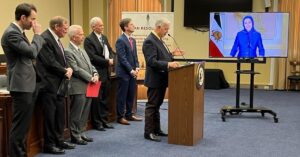NCRI President-elect Maryam Rajavi addressed the congressional briefing & thanked the co-sponsors, saying Iranian nation is ready to overthrow ruling theocracy
I am confident that this revolution will succeed, because the people of Iran are determined to end this regime and they are willing to pay the price for it.”
— Mrs. Maryam Rajavi, NCRI President-elect
WASHINGTON, DC, UNITED STATES, February 8, 2023 /EINPresswire.com/ — The U.S. Representative Office of the National Council of Resistance of Iran (NCRI-US) welcomes the bipartisan U.S. House resolution, H.Res.100, “Expressing support for the Iranian people’s desire for a democratic, secular, and nonnuclear Republic of Iran and condemning violations of human rights and state-sponsored terrorism by the Iranian Government.”
The timely initiative was introduced by Congressmen Tom McClintock (R-CA), and several of the 165 bi-partisan original cosponsors, at a congressional press conference, which Mrs. Maryam Rajavi, the president-elect of the National Council of Resistance of Iran (NCRI), also addressed via satellite.
Thanking the co-sponsors of the resolution, Mrs. Rajavi stressed, “I am confident that this revolution will succeed, because the people of Iran are determined to end this regime and they are willing to pay the price for it.”
The resolution which had Brad Sherman (D-CA) as lead Democratic sponsor, was submitted on the anniversary of the anti-dictatorial revolution of 1979, notes that “the Iranian people have been deprived of their fundamental freedoms for which reason they are rejecting monarchic dictatorship and religious tyranny, as evident in their protest slogans.”
The Congressional initiative states that the U.S. House of Representatives, “stands with the people of Iran who are legitimately defending their rights for freedom against repression” and “recognizes the rights of the Iranian people and their struggle to establish a democratic, secular, and nonnuclear Republic of Iran.”
The resolution notes “support for the opposition leader Mrs. Maryam Rajavi’s 10-point plan for the future of Iran, which calls for the universal right to vote, free elections, and a market economy, and advocates gender, religious, and ethnic equality, a foreign policy based on peaceful coexistence, and a nonnuclear Iran.”
Referring to the ongoing uprising in Iran nearly five months after it started, the bi-partisan resolution underscores, “these protests are rooted in the more than four decades of organized resistance against the Iranian dictatorship,” which have been “led by women who have endured torture, sexual and gender-based violence, and death.” It adds, “the similarity in slogans and tactics used by protests nationwide reflect the overarching demands of the Iranian people and point to the organized nature of the protests.”
The House resolution urges the United States to “be involved in any establishment of an international investigation into the 1988 extrajudicial killings” noting that “the killings of thousands of political prisoners in 1988 were carried out based on a fatwa to execute all political prisoners who remained loyal to the Iranian Resistance, and subsequent death commissions were formed on July 19, 1988, whose members included the current Iranian regime’s President, Ebrahim Raisi, an official from the Ministry of Intelligence, and a state prosecutor, to implement the fatwa.”
The resolution “calls on relevant United States Government agencies to work with European allies, including those in the Balkans where Iran has expanded its presence, to hold Iran accountable for breaching diplomatic privileges, and to call on nations to prevent the malign activities of the Iranian regime’s diplomatic missions, with the goal of closing them down and expelling its agents.”
The National Council of Resistance of Iran (NCRI) is a democratic opposition coalition founded in 1981 in Tehran, as an alternative to the clerical regime. It would serve as a provisional government led by its President-elect Maryam Rajavi, based on her Ten-Point Plan, once the theocracy is ousted. Its primary responsibility will then be to hold free and fair elections for a national and constituent assembly within six months after the fall of the regime, and to ensure the peaceful transition of power to the elected representatives of the Iranian people. The People’s Mojahedin Organization of Iran (PMOI), also referred to as the Mujahedin-e Khalq (MEK), Iran’s largest, most organized opposition group, is the principal member of the NCRI. Read more…
